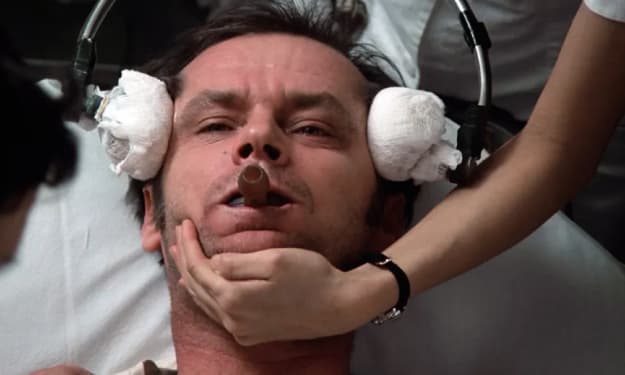Age 28 Address Pandemonium
A Most Wretched Diagnosis

“Dream not, Coleridge, of having tasted all the grandeur and wildness of fancy,’til you have gone mad.”
Charles Lamb (Dickens)
In my first year of graduate school, I reluctantly realized that there was something very wrong with me. I did not admit it, but I knew it. And so did everyone else. I was mad. Afflicted. Not crazy, though. No, no.
I had no use for either food or sleep. My thoughts raced and clanged about my head like a roller coaster possessed by demons. I felt like a genius with brilliant insight. My mood was elated, nay, euphoric as if powered by Peruvian cocaine of the finest grade. I was superhuman and a superhero, in my own mind. And I could not stop talking.
When you are going mad, you are the last to know. Everyone else does though; they’re embarrassed for you as you make a public ass of yourself, but not courageous enough to stop the shit show for fear the madness is contagious. I was 28 years old, and in graduate school at Boston University when I was diagnosed with Bipolar Disorder. I earned a perfect 4.0 grade point average the fall semester, but by the spring, I had to drop out.
The list of history’s famous manic depressives is so long that, it is said, it would be much easier to list those who are not. Suffice it to say that writers from Honore de Balzac to Virginia Woolfe, composers from Berlioz to Tchaikovsky, poets from Burns to Whitman, actors from Marlon Brando to Mae West, and scientists and politicians from Newton to Napoleon, are all united by this tincture of madness. But is it madness? Because it seems to be a disease infinitely capable of producing artistic genius - the Sistine Chapel, the Fifth Symphony, Starry Night, The Great Gatsby, the theory of gravity, Vito Corleone - and it has been documented as far back as Plato and Aristotle.
After my diagnosis, I was mortified. I wrapped myself in a cocoon of shame. It was 1998, the idea that my brain suffered from a chemical imbalance had not yet arrived on the diagnostic scene. I was told that I needed years of therapy, and the implication was clear: I was the cause of my malfunction. I was humiliated, embarrassed, and alone. I was not, however, in denial, but the one question that tormented me was, “am I crazy?” The answer was yes, and no.
The definition of crazy that circulates widely in society is doing the same thing over and over and expecting different results. This is not the definition of crazy; that is the definition of false expectations. The definition of crazy is more elusive - it can mean the inability to perceive reality, or the inability to appreciate risks, or as a slur about a psychiatric condition. The widespread acceptance of crazy as a descriptor of psychiatric conditions is the single-most influential factor that perpetuates the stigma that keeps out of the doctor’s office and on a barstool. Jails are the primary caretakers of psychiatric patients instead of hospitals because of the terrifying possibility of a psychiatric “label.”
To illustrate how acceptable it is to malign those with such diagnoses, Bill Maher quipped on his show whether or not Donald Trump gets his news from a “passing mental patient.” This late night one-liner tells us three things: 1) mental patients lack intelligence 2) the politically correct revolution bypassed psychiatry because a comedian can still garner a laugh on primetime television without being challenged and 3) mental patients are all the same. People still laugh about straitjackets, rubber rooms, voices in their heads, etc..and such asides only serve to alienate those who suffer these ailments by marginalizing and dehumanizing their experiences.
Mental illness is about as funny as a plane crash. Rose Kennedy was the eldest of the Kennedy clan, but something was desperately wrong with her. The sister of John and Ted and Robert suffered from seizures and violent disruptions of mood. ( It is widely believed she suffered a birth injury that disabled her). Her parents strove to find treatment for Rose, but she continued to regress. And then the lobotomy was invented. The procedure, which generally involved insertion of an ice pick through an eye socket to destroy brain tissue in the frontal lobe, was hailed as revolutionary, and the Kennedy’s swiftly arranged one for Rose. The operation left Rose permanently mute and disabled. The Kennedys were so ashamed at what they had done to their eldest daughter that they wrote The Americans With Disabilities Act. This is the tragedy of mental illness: it ruins people’s lives and causes immense silent suffering, yet we joke about it.
I braced for my first psychiatric appointment by readying myself for the stream of accusations about my personality that I would surely suffer. I barely knew what a psychiatrist even was, and like most Americans, my head was full of misconceptions. What I got was a six foot two blond haired doctor whose compassionate and kind manner caught me off guard. His sincerity, empathy, and understanding returned to me the dignity that I lost in the chaos of my sickness. My view of psychiatry changed from jokes about the couch to a deep appreciation for the specialty and reverence for these often ignored doctors whose daily work includes saving people’s lives. I had expected a confrontation with an arrogant practitioner; instead, I got human kindness that is not taught in medical school.
The second thing you lose after a DSM diagnosis, after your humanity, are your friends. They will all abandon you like they owe you money. Your resume will have unexplainable gaps, and when you are on a dinner date, you best think up something to explain why you collect disability because if you tell the truth, you might as well just let loose a giant fart at the table. In other words, you will be lonely because mental illness marginalizes you. It’s the cruel ketchup on your shit burger. Take your medicine, get a dog, try not to drink and do blow, know what to do when you want to kill yourself, and stay away from the cops and jail. There is a fine argument to be made that mental illness is not a sickness at all; it’s just an alternate condition of human experience. “Remember, it’s the crazy ones who change the world.” Rowan Gibson.
About the Creator
L. Erin Giangiacomo
I'm a writer because I can't hold a job and I have no friends. B.A. English Literature, J.D.






Comments
There are no comments for this story
Be the first to respond and start the conversation.